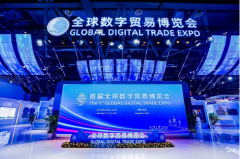"Singles Day," held on Nov. 11 every year, is the world's biggest 24-hour online shopping event. The number of orders registered on Chinese online retail giant Alibaba's cross-border e-commerce platform Tmall was a staggering new record of 583,000 in a single second. Between Nov. 1 and Nov. 11, sales on the platform totaled 498.2 billion Chinese yuan (about 75.4 billion U.S. dollars).
The annual "Singles Day" shopping festival is now in its 12th year, and it offers a chance for participating producers and retailers to promote the expansion of logistics chains between China and Europe especially through freight train connections.
And with good reason: a shopping bonanza of such magnitude would be unmanageable without solid logistics background.
The freight trains connecting Yiwu in east China's Zhejiang province with Madrid, the capital of Spain, or Wuhan in central China with Duisburg, a city in western Germany, or Jinan in east China with Budapest, Hungary, have long been considered a "life-channel" by the countries and regions they serve. During the current COVID-19 crisis, these services not only facilitate trade exchanges and economic recovery, but also help the partners pull together to overcome the pandemic.
From Yiwu to Madrid, from Wuhan to Duisburg and from Jinan to Budapest, China-Europe freight train has always faithfully fulfilled its mission of being a "life-channel" for countries and regions to join hands in fighting the pandemic, and at the same time contributed "Chinese strength" to promote trade exchanges and economic recovery.
MUTUAL BENEFICIAL
On the eve of the shopping festival, the very first freight train carrying over 1,100 tons of liquid milk and instant milk powder from Poland arrived in Wuhan in mid-October.
"I believe that, especially in the context of the tough situation in the European Union (EU) market for such good traditional Polish products, Poland should definitely look to export to China," said Agata Maziarczyk-Pisarska, chief commercial officer of the VICI Group, which co-organized the "dairy product express."
"I am motivated by innovation, and that was the main reason behind organizing the shipment of Polish milk and milk powder to China. As soon as the train arrived in Wuhan, I received inquiries about the possibility of organizing two further shipments," she said.
Agnieszka Maliszewska, director of the Polish Chamber of Milk, the country's largest dairy industry organization, told Xinhua that China is currently the largest importer of dairy products in the world, and there are indications that will remain so in the next few years.
Andrzej Juchniewicz, chief of the Polish Investment and Trade Agency's China office, said that this freight train shipment was not only the first of its kind from Poland, but also from the EU.
Of course, trade goes both ways. On Nov. 3, a freight train carrying 200,000 parcels left the Alataw Pass Comprehensive Bonded Zone, a major rail port in northwest China's Xinjiang Uygur Autonomous Region, for Europe. The parcels contained a wide variety of Chinese products ordered by customers in over 20 countries online. This new freight train service is managed by the Cainiao Network, Alibaba's logistics unit.
Xie Zhiyu, a manager of Cainiao Network, said that the train was scheduled to reach Europe by mid-November, and the parcels would then be delivered to their final destinations by trucks. The same freight train line is expected to deliver a further four million parcels to Europe from the Alataw Pass and from Yiwu and Zhengzhou in central China.
According to a report published in mid-September by Eurostat, in the first seven months of this year, China replaced the United States as the EU's top trading partner. Between January and July 2020, the EU's imports from China increased by 4.9 percent year-on-year, while its imports from the U.S. declined by 11.7 percent.
IRREPLACEABLE ROLE
The "Singles Day" shopping festival is just one, albeit salient, example. "A more reliable and predictable supply chain is needed instead of the previous 'just in time' system to ensure the continuity of production and sales," said Erno Peto, president of the Hungarian-Chinese Chamber of Economy.
Peto told Xinhua that the expansion of rail transport in general, and of the China-Europe freight train services in particular, will definitely help the economies recover as quickly as possible.
Between January and early November 2020, the number of China-Europe freight trains hit a record high of 10,180, the China State Railway Group Co., Ltd. reported. By Nov. 5, freight trains had transported 927,000 twenty-foot equivalent units (TEUs) of cargo, 54 percent more than a year earlier.
During the COVID-19 period, anti-epidemic supplies totaling 7.51 million items and weighing 62,000 tonnes were delivered from China to Europe by freight trains.
According to the latest figures from Germany's Chamber of Industry and Commerce of Lower Rhine, the number of China Rail Express (CRE) trains arriving in Duisburg this year has risen from 30-35 per week before the pandemic to a record high of 60 per week today.
Due to the pandemic, "shipping was once suspended and airfreight was also backlogged," commented Andree Haack, deputy mayor of Duisburg. In this situation, "the CRE played an irreplaceable role."
"Although many businesses in Duisburg and even in Germany ground to a halt due to the pandemic, the CRE trains maintained stable operations and have even increased their services," he said.
The CRE has become an "important logistical lifeline" by ensuring the smooth exchange of goods between China and Europe," he told Xinhua.
Jacek Danieluk, mayor of the eastern Polish city of Terespol, one of the EU's busiest border crossings, commented that "we already benefit from our location on the new 'Silk Road,' which is very real."
The growth of rail freight traffic from China may draw more investments in new transfer depots and in other projects in the area, he said. "Between 10 and 20 trains pass by Terespol each day already."
Furthermore, Danieluk believed that the increased freight traffic between Poland and China also helps his country strengthen its ties with its eastern neighbors.

